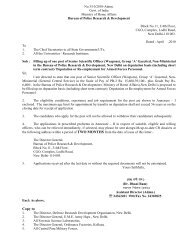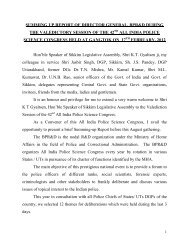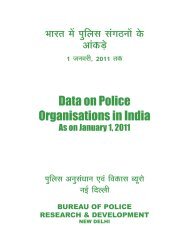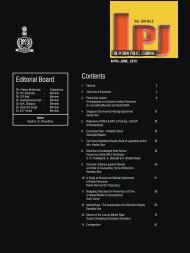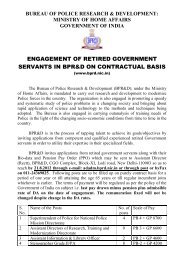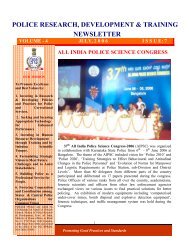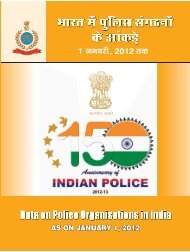exploit groups <strong>of</strong> ‘useful idiots’, to manipulatethe interstices <strong>and</strong> peculiar vulnerabilities <strong>of</strong>democracy, for propag<strong>and</strong>a, for campaigns <strong>of</strong>disruptive protests <strong>and</strong> demonstrations, to createlegal obstacles for the functioning <strong>of</strong> securityagencies, to propagate their virulent creeds, <strong>and</strong>to cl<strong>and</strong>estinely recruit to their ‘armies’. Theseare constituencies that adopt the language <strong>and</strong>idiom <strong>of</strong> democracy, even as they set about todestroy democracy. An overwhelming proportion<strong>of</strong> these activities cannot be countered withinthe framework <strong>of</strong> a normal ‘enforcement’apparatus – which is ordinarily galvanizedonly after the commission <strong>of</strong> a specific <strong>of</strong>fence.More significantly, democracies, in general<strong>and</strong> Indian democracy, in particular, havefailed to mount an effective counter-campaignat the ideological level. At least part <strong>of</strong> such acounter-campaign would necessarily include thesharing by intelligence agencies, <strong>of</strong> authoritativeassessments <strong>and</strong> information that does not haveoperational implications. Where these reach thesphere <strong>of</strong> public discourse, they would generateboth greater awareness <strong>and</strong> cooperation, on theone h<strong>and</strong>, <strong>and</strong> better feedback for the agenciesthemselves, on the other. The wholesale marking<strong>of</strong> all intelligence information as ‘secret’, is bothcounter-factual <strong>and</strong> counter-productive. There isa vast quantity <strong>of</strong> intelligence flows that can <strong>and</strong>should be widely published, <strong>and</strong> such publicationwould generate greater strength <strong>and</strong> credibilityfor the agencies <strong>and</strong> help promote India’s securityobjectives. An essential function <strong>of</strong> the agencies isto create the operational, political <strong>and</strong> diplomaticenvironment, where India’s security interests arebetter projected <strong>and</strong> protected. Public advocacy<strong>and</strong> creating international perceptions on a range<strong>of</strong> issues are essential to this function, <strong>and</strong> must befacilitated by moderated information flows fromthe agencies. It is useful to recall that a ‘media cell’was established within the Intelligence <strong>Bureau</strong>in 2004, <strong>and</strong> operated for a couple <strong>of</strong> years,but was abruptly <strong>and</strong> inexplicably dismantledthereafter, with information flows reduced tothe fitful, opportunistic <strong>and</strong> unreliable system <strong>of</strong>‘leaks’ once again. A permanent interface withthe media <strong>and</strong> public would serve both public<strong>and</strong> agency interests, <strong>and</strong> is an integral element<strong>of</strong> the modern intelligence apparatus in the moreadvanced countries <strong>of</strong> the West.These, then, are some <strong>of</strong> the legitimate <strong>and</strong>necessary functions <strong>of</strong> intelligence agencieswithin a democratic framework. However, just asdemocracy cannot be justified without referenceto outcomes, intelligence agencies will have toroot their own justification in the results theyproduce. To the extent that such results promotethe ends <strong>of</strong> democracy, the greater security<strong>of</strong> the people, <strong>and</strong> the substance – as againstthe rituals associated with the protection – <strong>of</strong>rights, their structures <strong>and</strong> operations will belegitimized. To the extent that their operationsincline to exceptionalism, partisan interventions<strong>and</strong> manipulation, <strong>and</strong> the further accentuation<strong>of</strong> the distortions <strong>of</strong> the system, they becomeprogressively delegitimized – <strong>and</strong> eventuallywill find their power openly challenged <strong>and</strong>destroyed.The crucial question, consequently, is: Whatmatters does intelligence serve? If it is harnessedto partisan interests, to distort democracy <strong>and</strong>suppress legitimate freedoms, it is the enemy<strong>of</strong> the people <strong>and</strong> <strong>of</strong> constitutional governance.This, unfortunately, is manifestly the case, forinstance, in Pakistan, where an entire nation hasbeen devastated by the machinations <strong>of</strong> a corruptelite operating through a lawless intelligenceapparatus.The legitimacy <strong>and</strong> the effectiveness <strong>of</strong>intelligence agencies are best served whereagencies make a clear distinction between thestate <strong>and</strong> regime – though the state is, <strong>of</strong> course,represented by the transient regime. Legitimateintelligence operations serve the interests <strong>of</strong> theconstitutional state, <strong>and</strong> are required to resistsubordination to the partisan interests <strong>of</strong> particularregimes from time to time. National security <strong>and</strong>constitutional values are the touchstone againstwhich legitimacy is to be defined. Intelligenceagencies discredit themselves by misdirection;by providing false, misleading <strong>and</strong> ‘convenient’intelligence – intelligence that conforms, not tothe realities <strong>of</strong> the ground, but to the expectations<strong>of</strong> the political executive <strong>and</strong> other ‘consumers’;or by their willingness to lend themselves topartisan political abuse <strong>of</strong> powers, or to political<strong>and</strong> electoral manipulation.Within a democratic framework, consequently,the integrity, effectiveness <strong>and</strong> legitimacy <strong>of</strong>intelligence agencies <strong>and</strong> their operations will46The Indian <strong>Police</strong> Journal, October - December, 2012, Special Issue
depend substantially on the restraints withinwhich they function. ‘Accountability’ hasbecome the new byword <strong>of</strong> intelligence reform,<strong>and</strong> many have quickly lifted current westernmodels <strong>of</strong> parliamentary oversight as the newpanacea for the ills that follow from the misuse<strong>and</strong> abuse <strong>of</strong> the intelligence apparatus. Likemany <strong>of</strong> our hasty <strong>and</strong> borrowed ‘solutions’,however, this reflects a misunderst<strong>and</strong>ing both <strong>of</strong>the original ‘models’ <strong>and</strong> <strong>of</strong> the ground situationwithin India. Efforts to impose Parliamentary <strong>and</strong>Congressional oversight in the West have proved,at best, cosmetic in impact, <strong>and</strong> Western agencieshave remained susceptible to misuse under anaggressive political executive – the case <strong>of</strong> thedistortion, indeed, fabrication, <strong>of</strong> intelligenceon Iraq’s WMD capabilities, by both US <strong>and</strong>British intelligence, is an obvious, though notisolated, example. The business <strong>of</strong> intelligencewill remain, by its very character <strong>and</strong> m<strong>and</strong>ate,secret. It is unlikely that the relatively immatureinstitutions <strong>of</strong> Indian democracy would be anymore successful than their Western counterparts,in creating an effective system <strong>of</strong> parliamentaryoversight though, given the pr<strong>of</strong>ile <strong>of</strong> electedrepresentatives in India <strong>and</strong> the polarized nature<strong>of</strong> the country’s politics, any such system canbe expected to be far more disruptive <strong>of</strong> theagencies’ operational effectiveness.The most effective system <strong>of</strong> restraints would beone that is based on pr<strong>of</strong>essionalism, efficiency<strong>and</strong> integrity <strong>of</strong> the agencies <strong>and</strong> their operations.Once again, invasive intelligence gathering <strong>and</strong>operations are legitimized by their outcomes.Where intelligence operations result in arrests,if there are clear convictions, within acceptabletime frames, through transparent judicialprocesses, such actions would find broad publicvalidation. Where intelligence-based operationsresult in protracted detentions with negativeor inconclusive judicial outcomes, publicopposition to such actions increases, even aspurported ‘victim communities’ become moreresentful <strong>and</strong> potentially radicalized. Again,where particular intelligence initiatives are seento serve transparent national interests, they will bepublicly validated; where they are seen to servepartisan <strong>and</strong> perverse political interests, they willbring the broader powers <strong>of</strong> the agencies underincreasing <strong>and</strong> intense scrutiny.This raises the question <strong>of</strong> one <strong>of</strong> the most glaringlacunae in India’s present system <strong>of</strong> intelligencegathering: the very limited quantum <strong>of</strong> evidentiaryintelligence – intelligence that can st<strong>and</strong> up tothe scrutiny <strong>of</strong> the Courts. Such evidentiaryintelligence, <strong>and</strong> the meticulous documentation<strong>of</strong> processes that lies at its foundation, has nowbecome an urgent imperative for all intelligenceoperations, both to secure the visible outcomesthat are a necessary component <strong>of</strong> legitimacy,<strong>and</strong> to exclude the misdirection <strong>and</strong> abuse <strong>of</strong>intelligence resources. The future legitimacy <strong>of</strong>agencies will depend on the integrity <strong>of</strong> process<strong>and</strong> the broader integrity <strong>and</strong> credibility <strong>of</strong> theagencies <strong>and</strong> their operations.It is abundantly clear that, given the very widem<strong>and</strong>ate <strong>of</strong> intelligence agencies within theframework <strong>of</strong> Indian democracy, <strong>and</strong> the risingimperatives <strong>of</strong> a greater efficiency <strong>and</strong> integrity<strong>of</strong> processes, current capacities across theboard – human, technological <strong>and</strong> material – areall drastically insufficient. Given their presentpr<strong>of</strong>iles, it is simply impossible for existingagencies to fulfil their necessary functions, <strong>and</strong> todevelop processes <strong>and</strong> records that would meetthe dem<strong>and</strong>s <strong>of</strong> integrity <strong>and</strong> pr<strong>of</strong>essionalism.This deficit <strong>of</strong> capacities lies at the very heart<strong>of</strong> the failure to meet the requirements <strong>of</strong>democracy – both in terms <strong>of</strong> the tasks that are tobe concluded <strong>and</strong> <strong>of</strong> the nature <strong>of</strong> processes thatmust be maintained. This problem also lies at theheart <strong>of</strong> many <strong>of</strong> the abuses that are criticized,particularly by the human rights lobby. The shortcuts become a necessity when the capacity,capability <strong>and</strong> endurance to run the full courseare lacking.The established judicial <strong>and</strong> human rightsnarrative in India has attributed the denial <strong>of</strong>freedom <strong>and</strong> suppression <strong>of</strong> rights to an excess<strong>and</strong> consequent abuse <strong>of</strong> power vested in stateinstitutions, <strong>and</strong> has thus sought to progressivelyconstrain <strong>and</strong> emasculate these. A counternarrativedem<strong>and</strong>s greater <strong>and</strong> greater impunityfor state agencies to counter rising threats tosecurity. Both these positions are a completemisreading <strong>of</strong> both reality <strong>and</strong> the imperatives<strong>of</strong> constitutional governance. The cumulativebrutalisation <strong>of</strong> the Indian state is a consequence,not <strong>of</strong> any excess <strong>of</strong> power, but <strong>of</strong> a progressiveerosion <strong>of</strong> capacities <strong>and</strong> capabilities. It is notThe Indian <strong>Police</strong> Journal, October - December, 2012, Special Issue 47
- Page 1 and 2:
The Indian Police JournalOctober -
- Page 3 and 4:
From the Director’s DeskNew Delhi
- Page 5 and 6:
23rd December, 1887: TheJourney beg
- Page 7 and 8:
Courtesy - National Archives of Ind
- Page 9 and 10: The Logo released on the completion
- Page 11 and 12: Helmsmen of the IB during thePre-In
- Page 13 and 14: SHRI V.G. VAIDYA, IPS(MAR 1992 TO J
- Page 15 and 16: “Sleeman sahib ki jai”“No Cri
- Page 17 and 18: their life and their problems relat
- Page 19 and 20: Settling down of criminal tribes wa
- Page 21 and 22: perish. Between 1841 and 1848, anot
- Page 23 and 24: In conclusion, I would like to reco
- Page 25 and 26: own race alone, had to be withdrawn
- Page 27 and 28: a bee in his bonnet” 17 , and abo
- Page 29 and 30: epresented by Tilak and his followe
- Page 31 and 32: The agency more and more fine-tuned
- Page 33 and 34: US was brewing, one William Hopkins
- Page 35 and 36: came under the control of Indian mi
- Page 37 and 38: neutralised many efforts by inimica
- Page 39 and 40: e published by the Intelligence Bur
- Page 41 and 42: As DD (Security), IB, I had occasio
- Page 43 and 44: Chhomohlohri, all of them juxtapose
- Page 45 and 46: Dormers Building, ShimlaThe Dormers
- Page 47 and 48: eforms. Warren Commission, on the a
- Page 49 and 50: and systems will increasingly come
- Page 51 and 52: violence and destabilisation. This
- Page 53 and 54: one develop. The all pervasive cult
- Page 55 and 56: etween the states and the centre su
- Page 57 and 58: Intelligence Agencies inIndian Demo
- Page 59: Democracies are, today, everywhere
- Page 63 and 64: Of Pistols and Pigs andthe Old Tidd
- Page 65 and 66: it is lovingly caressed hundreds of
- Page 67 and 68: Through the Eyes of an IB OfficerSh
- Page 69 and 70: an Intelligence agency. He used to
- Page 71 and 72: My J&K ExperienceShri R.K. Kapoor,
- Page 73 and 74: there. We remained stranded there f
- Page 75 and 76: Scaling Himalayan Heights withthe I
- Page 77 and 78: proceed to Dungti to supervise the
- Page 79 and 80: tour of the White House and Lincoln
- Page 81 and 82: into unconsciousness two hours earl
- Page 83 and 84: which was completed successfully wi
- Page 85 and 86: leaders. This happened around the t
- Page 87 and 88: My Unforgettable Yearsin the North-
- Page 89 and 90: stated that Prakash Singh, Assistan
- Page 91 and 92: take her into confidence. That woul
- Page 93 and 94: Police - Intelligence InterfaceShri
- Page 95 and 96: Shreekant Bapat and I surveyed the
- Page 97 and 98: excellence, dedication and commitme
- Page 99 and 100: Immigration, Inter-State Disputes,
- Page 101 and 102: Observations on India’s State and
- Page 103 and 104: assessments that arose after the ca
- Page 105 and 106: levels. The deficiencies of one par
- Page 107 and 108: of laying a network of useful roads
- Page 109 and 110: Technology in Intelligence-Future S
- Page 111 and 112:
These are just some of the aspects
- Page 113 and 114:
Figure 6: Open Source Information o
- Page 115 and 116:
events) and inference from evidence
- Page 117 and 118:
9North Atlantic Treaty Organization
- Page 119 and 120:
Shri Dave was posted back to the lB
- Page 121 and 122:
He even suggested separate pay scal
- Page 123 and 124:
The Unsung HeroesThe Intelligence B




